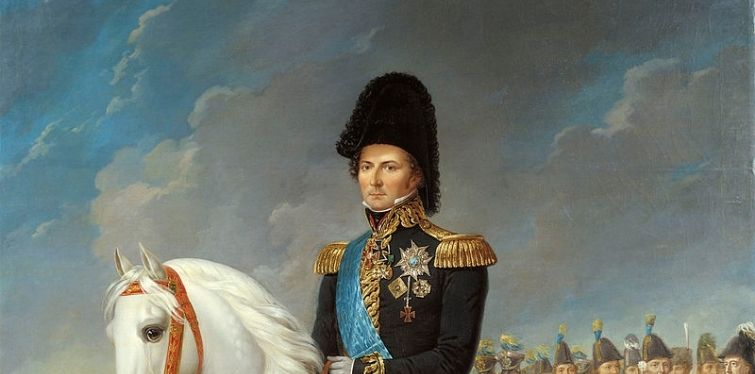Jean Baptiste Bernadotte is one of the most fascinating characters of the Napoleonic period. This blog post is the first of a two part series on the man who began his career as a Gascon lawyer and French Revolutionary soldier and ended it as the King of Sweden. This post offers a biographical overview of Bernadotte’s long and eventful life, next time we will examine his complex legacy.
Jean Baptiste Bernadotte was born in January 1763 in the town of Pau in Gascony. He had been a young lawyer when his father died in 1780, which prompted him to join the army. He enlisted in the Regiment Royal – La Marine where he developed a reputation as a strict disciplinarian and won rapid promotion. By 1785 he was promoted to sergeant, and three years later sergeant-major. His tall appearance and fine dress earned him the nickname Sergeant Beau-Jambes (Sergeant Fair Legs) from his men. On the eve of the French Revolution Bernadotte’s regiment was posted in Marseilles amidst increasing political disturbances.
Like many other young talented officers in the royalist army, the Revolution provided a golden opportunity to rise up the ranks. Sergeant Beau-Jambes would not remain a sergeant for long, being appointed lieutenant in 1791. After first seeing action at Ruzlheim in May 1793 as adjutant to the 36th Infantry Regiment, Bernadotte swiftly rose up the ranks to become colonel of the 71st Demi-Brigade the following year. The French Revolutionary Army owed its success to men like Bernadotte who were able to rally their men when they proved far less enthusiastic about fighting for the Republic once the first shots were fired.

Lieutenant Bernadotte of the 36th Line Regiment
At the Battle of Fleurus in June 1794, Bernadotte led a brilliant attack against Austrian infantry which won him promotion to brigadier general on the field. By October he was general of division. It was a meteoric rise for someone who had begun the year as a captain. Bernadotte continued to serve in a range of military and civil posts in 1795-96. In August 1796 the 9,000 man division under his command was isolated at Theiningen near Ratisbon, but through his inspirational qualities, the force managed to hold back Archduke Charles’s 28,000 Austrians, inflicting great losses in the process. In Paris, Director Paul Barras remarked that “there was something of Xenophon in Bernadotte” during this action.
In February 1797 Bernadotte was sent to reinforce General Bonaparte’s Army of Italy. The men met for the first time in March of that year, beginning a complicated and tumultuous relationship. Both men saw each other as rivals, each of whom commanded the loyalty and respect of their subordinates. For the time being they worked together, with Bernadotte leading the right wing and defeating an isolated Austrian column at Gradisca on 17 March. Bonaparte soon made peace with the Austrians and in early 1798 recommended that Bernadotte be sent to Vienna as ambassador. Bernadotte’s display of his republican principles provoked a Viennese mob to attack his embassy and tear down the tricolour, prompting him to return to France.
In the summer of 1798 Bernadotte was back in Paris where he met and married Désirée Clary, whose sister Julie had married Joseph Bonaparte. Désirée herself had been engaged Napoleon before the latter ditched her in favour of Josephine de Beauharnais. It is said that she had chosen to marry Bernadotte because he was capable of standing up to Napoleon. The two men were now brothers-in-law.

Desirée Clary
While Napoleon was campaigning in Egypt, in July 1799 Bernadotte was appointed Minister of the War with the support of Joseph and Lucien Bonaparte. His abrasive style meant he didn’t last for long. When informed there was no money in the treasury, he sent orders to stir up the men at the front, and before long the necessary supplies were furnished. After the incident Directory was alarmed at Bernadotte’s popularity and dismissed him from office in September. When Napoleon returned to France from Egypt, Bernadotte unsuccessfully attempted to have him arrested for desertion and breaking the quarantine that applied to ships returning from Egypt. When asked by his brother-in-law whether he would support the coup of 18 Brumaire, Bernadotte remained neutral.
After Napoleon took power the two men attempted to mend relations, with Bernadotte taking command of the Army of the West in 1800, an assignment which largely involved suppressing royalist rebels in the Vendée. When Napoleon discovered that Bernadotte’s subordinates were disgruntled about Bonaparte’s absolutism and were plotting against him, he threatened to have Bernadotte shot. The Clary sisters prevailed upon the First Consul to relent, prompting him to appoint Bernadotte as Governor of Louisiana and Ambassador to the United States. As Bernadotte was preparing to set sail, he learned that Napoleon had sold Louisiana to the Americans, and refused the embassy, leaving himself once again a free agent.
In 1804, as Napoleon crowned himself emperor and prepared the next move in his war with Britain, Bernadotte was 7th on the list of 18 marshals. In 1805 Marshal Bernadotte commanded I Corps in Napoleon’s Grande Armée against the Austrians. During the Ulm campaign I Corps covered the left flank, which violated Prussian neutrality by marching through Ansbach, though this did not have immediate consequences. At Austerlitz, Bernadotte performed competently as his corps exploited the gap in the allied centre created by Soult’s attack on the Pratzen Heights.

Bernadotte as Marshal of France
In June 1806 Bernadotte was created Prince of Pontecorvo, which had formerly been a papal enclave in the Kingdom of Naples. In October 1806 he joined Napoleon’s invasion of Prussia. Napoleon had believed that the main Prussian army was concentrated around Jena and sent Bernadotte and Davout to cut off the Prussian retreat to the north. As it happened, Davout stumbled upon the main Prussian army at Auerstedt and quickly sent word for Bernadotte to support his outnumbered force. Marching towards Jena via Dornburg, Bernadotte continued to execute his previous orders from Napoleon and did not turn round. As a result, while Davout managed to defeat the Duke of Brunswick’s main Prussian army at Auerstedt alone, by the Bernadotte arrived at Jena Napoleon had already easily defeated Hohenlohe’s smaller Prussian force.
Having avoided both battles, Bernadotte’s fresh corps was in prime position to pursue the Prussians, successfully overcoming the Prussian rearguard at Halle on the 17th. The pursuit continued until the old Hanseatic port of Lübeck, where he forced the surrender of General Gebhard von Blücher’s force. A Swedish division had been caught up in the action and its officers were impressed by Bernadotte’s courtesy and respect, as well as his ability to keep his men well-disciplined. He did not know it at the time, but this fortuitous encounter would prove of great significance for Bernadotte’s future.
In January 1807, Bernadotte’s Corps occupied Napoleon’s left flank in East Prussia. While in winter quarters, the Grande Armée was surprised by Russian commander Bennigsen’s attack on its left. Bernadotte was forced to retreat from Mohrungen but held back the Russian vanguard, allowing Napoleon to conceive of a counteroffensive to exploit Bennigsen’s exposed position. On 7-8 February the French and Russians fought a bloody stalemate at the Battle of Eylau. Prior to the battle, all the couriers Marshal Berthier sent to Bernadotte were intercepted by Cossacks, leaving Bernadotte ignorant of the situation and absent from the field while giving Bennigsen advance notice of Napoleon’s plans.
After being wounded at Spanden in June – absenting him from the Battle of Friedland, during which the soon-to-be Marshal Victor commanded I Corps with great distinction – Bernadotte settled down to the post of Governor of Hamburg, Bremen and Lubeck. In the spring of 1809, after Austria declared war on France and invaded Bavaria, Bernadotte was given command of the Saxon Army, which served as IX Corps in the Grande Armée. During the evening of the first day of the Battle of Wagram on 5 July 1809, Bernadotte’s Saxons suffered terrible losses when ordered to attack the Austrian line frontally. The following day, with his Saxons extremely exposed and suffering from friendly fire, Bernadotte ordered his men to fall back from Aderklaa, creating a gap in the French line. Napoleon was incensed at Bernadotte’s insubordination forced him to relinquish his command. Matters were made worse when Bernadotte praised his men for their conduct during the battle, earning him an official rebuke.
No sooner had he returned to Paris, in August Bernadotte was appointed to command the Army of Antwerp to defend Holland against the landing of Lord Chatham’s force at the island of Walcheren. In the event, the British troops were decimated by malaria and poor weather, and were in no position to move off the island to attack. However, despite capably organising the defence of Antwerp, Bernadotte had once more irritated Napoleon by boasting about his credentials, and he was soon subordinated to Marshal Bessieres.
After Walcheren, Bernadotte found himself in the familiar position of being unemployed and out of favour. A stroke of good fortune came courtesy of the Swedish court. In 1810 King Charles XIII of Sweden’s adopted heir, the Danish Prince Charles August, had died. The Swedish notables, keen to maintain amicable relations with Napoleon, suggested Bernadotte. his earlier encounter with Swedish officers made him an excellent candidate. Napoleon found the prospect of Bernadotte as a crowned monarch of a foreign land laughable, but soon came round to the idea. He was able to rid himself of a troublesome and ambitious subordinate while placing a family member on the Swedish throne, whom he expected would enforce the continental blockade against British trade. On 21 August 1810, Bernadotte was unanimously elected Crown Prince of Sweden and converted to Lutheranism. During his final meeting with Napoleon in Paris, Bernadotte refused when asked to promise not to bear arms against France. Nevertheless, Napoleon released him from his obligations and told him to go.
Thus, from 1810 onwards, we should no longer speak of Marshal Bernadotte, but of Crown Prince Charles John (Karl Johan) of Sweden. Crown Princess Desirée joined her husband in 1811, but unable to cope with the Swedish climate she returned to Paris after a year. As Crown Prince, Charles John's policies were directed towards Swedish interests. Still smarting from the loss of Finland to Russia in 1809, Sweden knew that it would be impossible to wrestle it back. The new Crown Prince turned his gaze westwards to Norway, which at the time was part of Denmark, a firm Napoleonic ally. At the same time, Sweden was keen to maintain trade relations with Britain, thus violating the Continental Blockade she had signed up to following defeat to Russia, still a Napoleonic ally. When Napoleon responded by sending Davout to occupy Swedish Pomerania in 1811, Franco-Swedish relations were increasingly strained and Sweden foreign policy began to turn towards its old enemy, Russia. As Russia prepared for Napoleon’s invasion in 1812, the Tsar and the Crown Prince agreed a defensive alliance and Russian support for the conquest of Norway.
By early 1813, as Russian and Prussian armies cut their way through northern Germany, Sweden agreed to send a force of 30,000 to northern Germany subsidised by the British Treasury. In return the British agreed to support Sweden’s designs on Norway. Together with Russian, Prussian, and Austrian allies, Charles John contributed to the development of the Trachenberg Plan by offering his insight into Napoleon’s modus operandi. Three multinational armies under Austria’s Schwarzenberg, Prussia’s Blücher, and Charles John himself would weave a net around the French forces, attacking Napoleon’s marshals but falling back when the Emperor himself was on the scene. During the autumn 1813 campaign, the Crown Prince’s Army of the North performed well, defeating Oudinot at Grossbeeren and Ney at Dennewitz, securing allied control of Northern Germany. He was constantly worried about his rear and sought to preserve his Swedish soldiers for the future conquest of Norway, preferring instead to send his Prussian and Russian contingents to do the fighting. At the Battle of Leipzig, Bernadotte arrived on the field 48 hours after the battle started, and only took offensive measures when Blücher agreed to reinforce him with half his army. Nevertheless, he looked the part of a great commander astride his grey horse surrounded by a British rocket troop that was attached to his army, and the arrival of the Army of the North compelled Napoleon to withdraw.

The Battle of Dennewitz
After the great allied victory at Leipzig, the Army of the North turned back north, driving back Napoleon’s Danish allies and securing the exchange of Norway for Swedish Pomerania, before detaching a force to deal with Davout’s garrison at Hamburg. When he crossed into France in February 1814, he promised that he was not fighting France but Napoleon. This did not prevent the locals from seeing him as a traitor and an invader. When Paris fell at the end of March, Charles John was at Liege and any hope he had of being a candidate for the French throne – a prospect that Tsar Alexander had dangled before him – was lost. After a couple of weeks in Paris, where he met Desirée and several of his old comrades, he returned to Sweden in the nick of time, as Norway declared independence on 17 May. In a swift campaign he managed to defeat the Norwegians but granted them autonomy under the Swedish crown.
In 1818, following the death of Charles XIII, the Crown Prince became King Charles XIV John of Sweden. Desirée finally joined him for good in 1823, adopting the Latinized name Queen Desideria. Charles XIV enjoyed a successful reign as King of Sweden and Norway, bringing peace and prosperity to both kingdoms. The national debt was paid off, growth of the agriculture and shipping industries fuelled a rapid increase in population, and the Göta canal linking Gothenburg to the Baltic was completed in 1832. In spite of his difficulties mastering the Swedish and Norwegian tongues, his personal charm won him many admirers. As King, notwithstanding the youthful republicanism of his youth, he pursued a conservative policy which saw him attacked in the liberal press. In 1840 the Swedish Parliament called for his abdication, but he survived after offering concessions. On the foreign policy front, after fighting dozens of battles across Europe, Charles John decided that Sweden should remain at peace. Concerned about the prospects of a war between Britain and Russia and its impact on the lucrative Baltic trade, in 1834 the King pre-emptively declared neutrality and maintained good relations with both powers.

King Charles XIV John of Sweden
King Charles XIV, formerly Marshal Bernadotte, died on 8 March 1844 at the age of 81, a year after celebrating his silver jubilee. He was mourned as a popular king of Sweden who had restored peace and a sense of national pride, leaving behind a dynasty which continues to reign in Sweden today. In France, however, Bernadotte’s reputation is that of a man who betrayed his homeland and fought against his former comrades in arms. Despite his exemplary service in the Revolutionary Wars, his name is absent from the Arc de Triomphe. Bernadotte continues to provoke debate among historians, so make sure to check out our upcoming blog post where we assess his legacy.



Share and get 15% off!
Simply share this product on one of the following social networks and you will unlock 15% off!